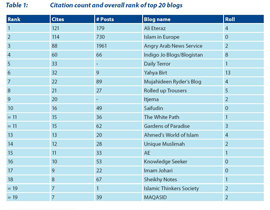UK study on Islamic blogs ‘flawed’
Experts and academics lambast a Home Office report identifying pro-Islamic websites

 |
| Muslim institutions, such as Islamic bookstores, left, and mosques, have increasingly come under scrutiny since the September 11 and July 7 attacks on the US and UK, respectively [EPA] |
The UK Home Office last week released a study naming the most influential “pro-Islamic” bloggers in an attempt to estimate the scale and influence of Islamic bloggers in the UK.
Published by Contest,the country’s counter-terrorism strategy and its supportive arm – the Research, Information and Communications Unit (Ricu) – the study estimates and trackS the scale and influence of Islamic (and pro-leaning) bloggers who post in English on topics pertaining to politics in and about the UK.
Keep reading
list of 4 itemsCould shipping containers be the answer to Ghana’s housing crisis?
Are Chinese electric vehicles taking over the world?
First pig kidney in a human: Is this the future of transplants?
The report also measures the reach of social networking within the Islamic blogging community and provides some form of hierarchical structure to it.
Like the Berkman Center’s mapping of the Arabic-language blogospherethe study used link analysis as a method to determine popularity of certain blogs.
Link analysis is used to map relationships between blogs and other sites by studying the outbound links coming from the sites designated by a study.
“Pro-Islamic” blogs
 |
| Ricu used link analysis and key words to draw up a list of 20 “Islamic” blogs |
However, unlike the Berkman Centre’s study, which focused on the wider Arabic-language blogosphere and encompassed over 35,000 blogs (6,000 of which were then mapped, and 4,000 of which were hand-coded by Arabic-speaking researchers), the Ricu study looked at around 140 blogs.
These were identified (by the primary researcher, using keywords) as “pro-Islamic,” gathered from the blog directories BlogCatalog, Blogorama, (the now defunct) BritBlog, eTalkingHead, and Technorati, and found via keyword searches on Google Blog Search.
The researchers then identified the top 20 blogs for deeper analysis.
But some media analysts have criticised the list as a shot in the dark, which compiled a list of some sites which have little to no relation to Islamic bloggers.
The first blog on the list is that of Ali Eteraz, a Pakistani lawyer and novelist, whose book made it to Oprah’s gilded book list.
He has contributed online for Jewcy, a website which The Guardian called “a cultural icon at the forefront of a new wave of Jewish culture and pride”, and the Huffington Post.
Edip Yuksel, a leader in the American Islamic reform movement, says Eteraz is the last man to be associated with terrorism.
“Listing Ali’s name in a research to track terrorists is a travesty of truth. Muslim intellectuals like Ali are our best hope for global peace, justice and progress,” Yuksel said.
“I do not think that this reflects the incompetence of Ricu researchers. To the contrary, it continues the same line of distortion and fabrication, and the designed and calculated incompetence, to promote the diabolic agenda of a cabal.”
The third blog on the list also raised some eyebrows, if not led to laughter of irony.
An Angry Arab
The Angry Arab blog is written by As’ad Abukhalil, a Lebanese-American professor of political science at California State University, Stanislaus, and visiting professor at the University of California, Berkeley.
According to statements he has made on his blog, he is a self-proclaimed atheist and secularist.
Abukhalil, who has regularly written for Al Jazeera, said that the Ricu study “shows the ignorance of Western government and their media standards”.
“Arabs and Muslims are treated like a monolith with no distinctions and delineations permitted to categorise them,” he said.
“Just as the colonial powers treated them as a lump of people, they are still seen that way.”
Rime Allaf, an associate fellow at Chatham House, the UK-based institute for debate on international affairs, agrees: “Having claimed to be fighting a ‘war on terror’ for several years, the British government is expected at the very least to know its enemy; if not, it should pretend to know the subject about which it has been preaching ad nausea,” she said.
“Designating Angry Arab as a leading Islamist site full of incitement to would-be jihadists would have been laughable had the subject not been one of life and death for so many of Britain’s targets in this one-sided war,” Allaf said.
Al Jazeera attempted to contact Contest, but was told media requests would be responded to within 20 days.
Link analysis
As the Ricu study relied on link analysis, it is conceivable that the Angry Arab blog would turn up in the initial results; AbuKhalil is a prolific blogger, who links often to news stories – those with which he agrees and those which he does not.
The report’s chief author David Stevens, of Nottingham University, appears to offer no criteria to justify classifying Abukhalil as a “pro-Islamic leaning blogger”.
The Guardian‘s Brian Whitaker also criticised the listing of the Angry Arab blog in the Ricu report, but went further.
“Islam in Europe, listed as the second most influential blog, is not what many people would think of as a proper blog. It’s basically a collection of news reports from the mainstream media about – well, Islam in Europe,” Whitaker wrote on March 25.
Analysts such as Allaf, believe the report is methodologically flawed. Reliance on link analysis and keywords (often used by bloggers to self-define) is not enough of a distinguishing gradient; blogosphere research requires a human touch.
According to his staff profile on the Nottingham University website, Stevens’ main area of research is contemporary Anglo-American (normative) political philosophy, not mass or social media.
Neither Ricu nor Stevens could be reached for comment.
Jillian York is a writer, blogger, and activist based in Boston. She works at the Berkman Centre for Internet & Society and is involved with Global Voices Online.